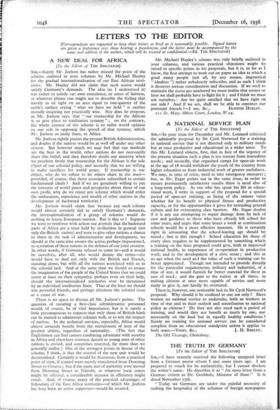A NATIONAL SERVICE PLAN [To the Editor of THE SPECTATOR]
Snt,—In your issue for December 2nd Mr. Lennard criticised the admirable proposal by Sir Cyril Norwood for a training in national service that is not directed only to military needs but at once productive and educational in a wider sense. To this Mr. Leonard objects, first, that in face of the urgency of the present situation such a plan is too remote from immediate needs ; and secondly, that organised camps for open-air work at the age of 18 would withdraw the youth 'óf the country from higher education or from industrial work of greater usefulness. We may, in time of crisis, need to take emergency measures ; but, as Mr. Eagar points out in the same issue, in order to ensure permanently satisfactory results there is need also of a long-term policy. As one who has spent his life in educa- tional work, I write in support of the proposal for a special period of open-air training, as being of the utmost value whether for its benefit to physical fitness and productive capacity, or for the opportunities it gives for extending general culture and for overcoming class barriers. Mr. Eagar doubts if it is any use attempting to repair damage done by lack of care and guidance to those who have already left school for some years, and urges that some hours a week at continuation schools would be a more effective measure. He is certainly right in advocating that the school-leaving age should be raised ; but is this enough ? School education for those of every class requires to be supplemented by something which a training on the lines proposed could give, both in improved national health, in experience of co-operation in productive work, and in the development of a civic sense ; and this at an age when the need and the value of such a training can be better appreciated. Though not intended to provide directly for the particular requirements, military and industrial, of a time of war, it would furnish far better material for these in case of need ; and the gain to the nation at all times, in making citizens at once more capable of service and more ready to give it, can hardly be overrated.
There is, however, one noticeable lack in Sir Cyril Norwood's proposal. Why should it be confined to one se X only ? Have women no national service to undertake, both as workers in time of war and in their outlook and contribution to national policy as citizens ? Do they not also need such a period of training, and would they not benefit as much by one, not necessarily on the land but in equally healthy conditions ? Surely no training for national service can be considered complete from an educational standpoint unless it applies to
both sexes.—Yours, &c., J. H. BADLEY. The Old Vicarage, Cholesbury.














































 Previous page
Previous page